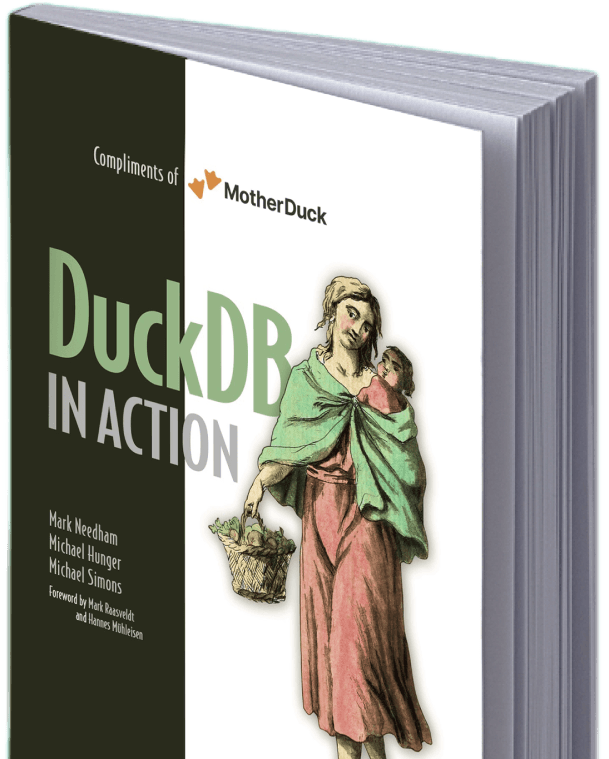3 min read
Conclusion
INFOThis is a summary of a book chapter from DuckDB in Action, published by Manning. Download the complete book for free to read the complete chapter.
What We Have Learned in the Book
This chapter recaps the journey through DuckDB, starting from installation to using the CLI and Python API. It covers how to load and analyze data from CSV, JSON, and Parquet files using SQL, and how DuckDB integrates efficiently with Pandas DataFrames. The book delves into SQL features, including advanced options like window functions and CTEs, and highlights unique functionalities DuckDB adds to standard SQL. Practical integration examples with tools like dbt, dltHub, and Dagster, as well as data visualization via Streamlit and Apache Superset, were provided. Lastly, handling large datasets and performance considerations were discussed.
Upcoming Stable Versions of DuckDB
The release of DuckDB 1.0 is imminent, offering a stable version that builds upon pre-release 0.10.0. This version aims to stabilize features, APIs, and formats, ensuring backward and some forward compatibility. It will also support automatic handling of database version format changes, extending these capabilities to the MotherDuck service as well.
Which Aspects Did We Not Cover
The book, being an introductory guide, did not delve into DuckDB's internal workings, including its architecture, query execution engine, indexing capabilities, storage layer, and vectorized execution model. While CLI and Python API usage was emphasized, APIs for other languages like C, R, Rust, Go, JavaScript, etc., were not covered in depth. Performance optimization techniques were briefly mentioned but not explored in detail. The book also skimmed over the extension framework and the extensive ecosystem of partners integrating DuckDB into their products and services.
Where Can You Learn More
For comprehensive learning, the DuckDB documentation at duckdb.org/docs is highly recommended. The MotherDuck documentation is another valuable resource. YouTube channels, DuckDB Discord, and MotherDuck Community Slack provide tutorials, talks, and community support. For contributors, DuckDB's GitHub repository is the go-to place for source code, bug/issues tracking, and feature requests.
What Is the Future of Data Engineering with DuckDB
DuckDB is poised to become a significant player in data engineering, offering versatile solutions for local and large-scale data processing. Its efficiency in processing private data on personal devices will become increasingly relevant. DuckDB is expected to replace SQLite in many applications, offering analytics, data aggregation, and pre-filtering capabilities. It stands out for cost-effective handling of gigabyte to terabyte-sized datasets, making it a competitive alternative to cloud data warehouses like BigQuery, Redshift, and Snowflake. Future developments may include integration with Generative AI, streaming data processing, and enhanced usability for more flexible and user-friendly data processing.


